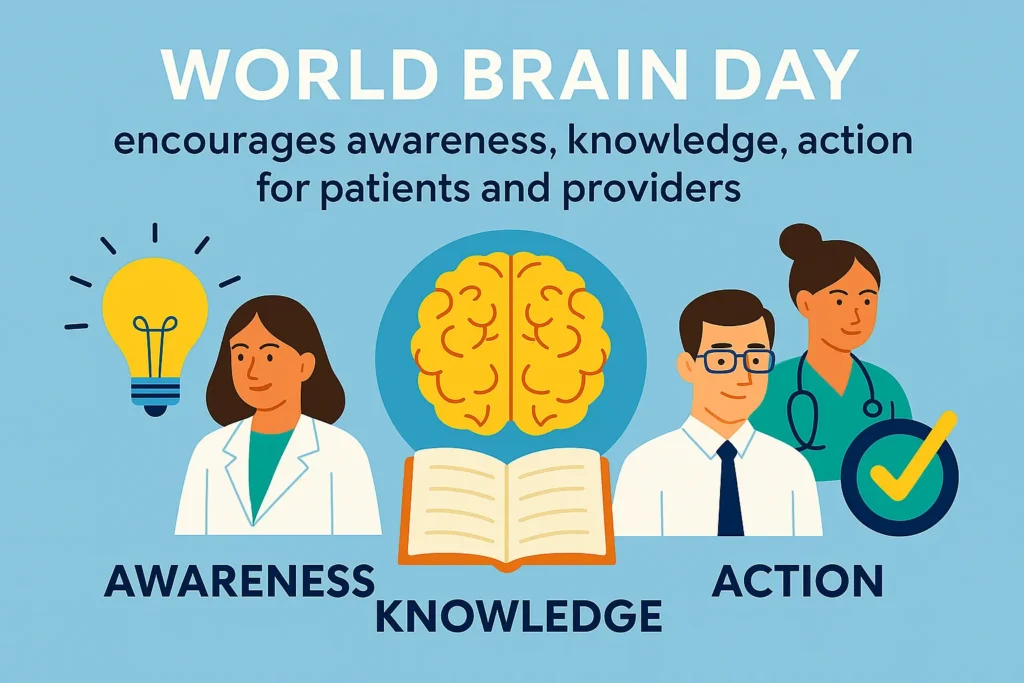### 🌍 **World Brain Day 2025: Focus on Brain Health for All Ages**
Organized by the **World Federation of Neurology**, this year’s World Brain Day (July 22) emphasizes the importance of brain health throughout all stages of life and aims to raise awareness and prevent neurological disorders. Dr. Bruce Ovbiagele, president of the **Society for Equity Neuroscience (SEQUINS)**, shared key insights with *Healio* about the importance of individual, community, and global efforts to support brain health.
### 🧠 Key Factors for Brain Wellness
Maintaining brain health requires:
Adequate **sleep** and **nutrition**
* **Social engagement**
* Openness to **new ideas** and **experiences**
Healthcare professionals and individuals have several avenues to improve brain health awareness and take meaningful action.
### 📲 Improving Awareness & Early Intervention via Digital Tools
Dr. Ovbiagele emphasized the role of technology and social media in combating stigma and increasing public awareness of neurological conditions. He suggested five ways professionals can make an impact:
1. **Leverage telemedicine** to ensure quicker, more accessible care.
2. **Build a digital presence** by sharing infographics, videos, blogs, and podcasts to educate the public.
3. **Engage in awareness events** like World Brain Day via social media to advocate for brain health education and funding.
4. **Share anonymized patient stories** to reduce stigma, humanize conditions, and encourage support.
5. **Collaborate with advocacy groups and influencers** to expand reach and highlight support resources.
–
### 📚 Empowering Patients, Caregivers & Families
With today’s technology, families and patients can be proactive about brain health. Strategies include:
* Using **secure messaging** within telehealth systems to keep in close contact with healthcare providers.
* Accessing **digital tools** with easy-to-understand language to build knowledge around brain health, treatments, and research.
* Participating in **online support forums** to share experiences and seek help.
* Subscribing to resources like *Brain & Life* magazine or listening to podcasts such as *No Brain Behind* to stay informed.
### ✅ Implementing Evidence-Based Practices
To promote lifestyle changes and brain health measures such as nutrition and vaccination, healthcare professionals should:
1. Stay updated through **continuous medical education**, journals, and conferences.
2. Create **standard clinical pathways** that incorporate evidence-based practices.
3. Educate patients and families on the **importance of these interventions**, emphasizing shared responsibility.
4. Understand patients’ **home and community environments** to tailor support accordingly, including referrals to local programs.
5. **Monitor adherence** and adjust care plans as new research becomes available.
🌐 Expanding Access to Brain Health Care Globally
Efforts to increase access to brain-related care are being tailored to suit both under-resourced communities and developed regions:
* In **low-income areas**, mobile technologies, telehealth, and community health workers are helping bridge access gaps.
* Organizations like SEQUINS are working to address health disparities by engaging communities and improving clinical trial participation.
* In **wealthier countries**, collaborations between public and private sectors are driving **national brain health plans**, focusing on early detection and quality care.
* Initiatives like the **CDC’s Healthy Brain Initiative** and tools like the **Brain Care Score (BCS)** are helping individuals assess and improve their brain health by targeting preventable conditions like stroke and dementia.
📣 Advocating for Local and State-Level Research
Individuals looking to promote brain health research can:
1. Connect directly with **local and state representatives** to advocate for funding.
2. Share **personal experiences and data** that demonstrate the benefits of research in their communities.
3. Collaborate with **universities, businesses, and non-profits** to create stronger support networks.
4. Form or join **local advocacy groups** to make a unified appeal during public events or town halls.
5. Emphasize how **increased local investment** in brain research can lead to lasting improvements in health outcomes.


